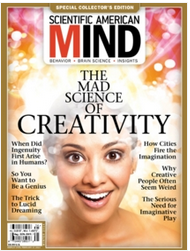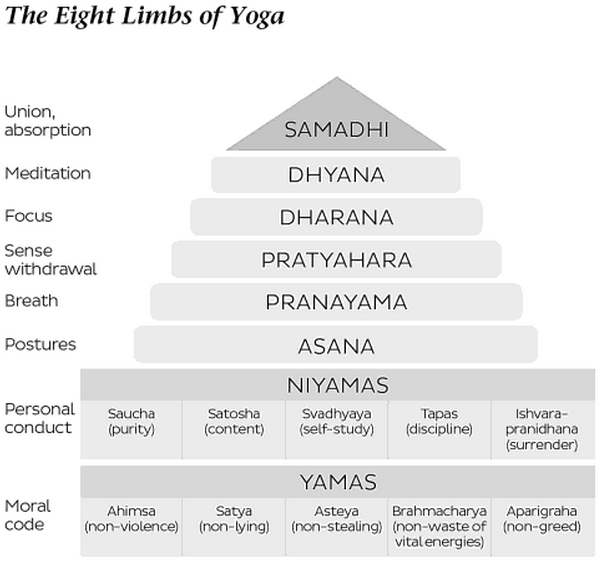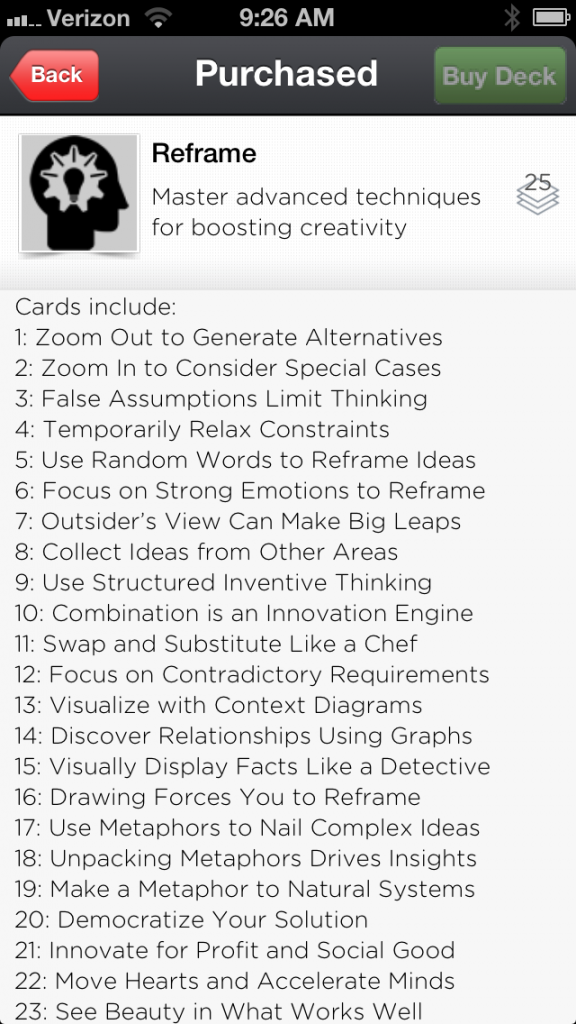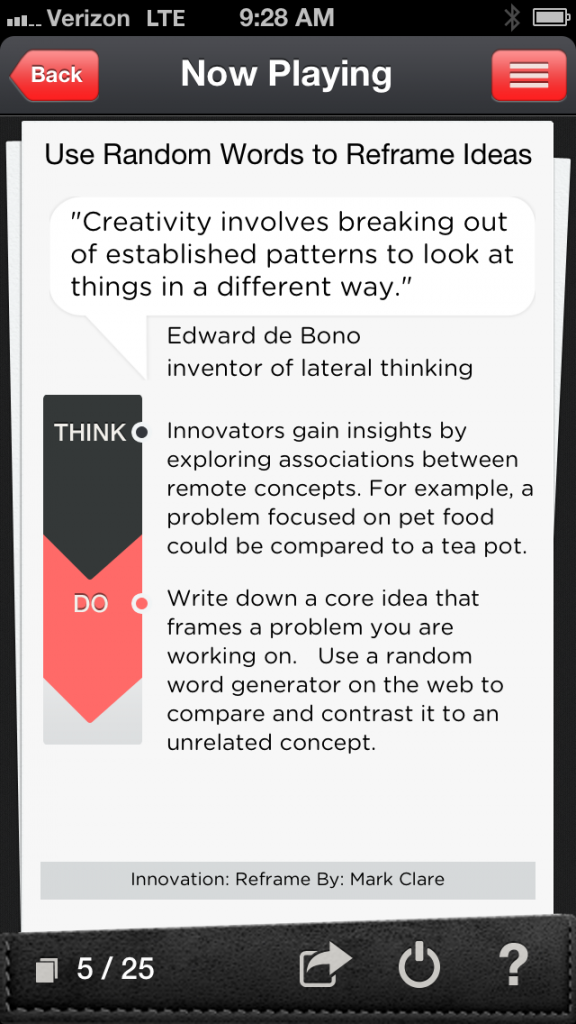Categories: Books, Cognitive Development Tags:
10 Minutes of Exercise Speeds up Your Thinking
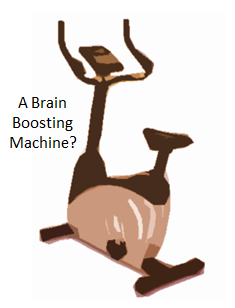 There is little doubt that physical exercise is a proven technique for both brain development and improving cognitive and emotional performance in real-time. There are many posts on the Next Brain blog that share the relevant research and techniques.
There is little doubt that physical exercise is a proven technique for both brain development and improving cognitive and emotional performance in real-time. There are many posts on the Next Brain blog that share the relevant research and techniques.
A recent post in the National Geographic, how 10 minutes of exercise gives your brain a boost, adds more weight to the point. Just minutes on a stationary bike produced an meaningful increase in the speed and accuracy of task-based thinking.
Fortunately, I have a stationary bike and have tested this technique many times. I will set my mind on a decision or problem and ruminate while riding. Useful insights are delivered about 30% of the time. Interested to hear from readers that may use this or a similar technique.
Categories: Other Tags:
Your Next Brain on Yoga?
There have been a handful of studies that suggest Yoga exercise and meditative practices can improve cognitive performance and brain function in adults and children. Just the kind of stuff we report on in the Next Brain Blog.
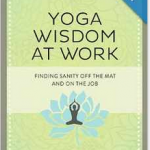 One challenge in using Yoga as a cognitive development technique is that most approaches appear to be limited to what you can do on an exercise mat or in quite isolation. That’s one reason the book Yoga Wisdom at Work caught my attention. The authors, Maren and Jamie Showkier, demonstrate through stories and practical tips ways you can apply Yoga “off the mat and on the job”.
One challenge in using Yoga as a cognitive development technique is that most approaches appear to be limited to what you can do on an exercise mat or in quite isolation. That’s one reason the book Yoga Wisdom at Work caught my attention. The authors, Maren and Jamie Showkier, demonstrate through stories and practical tips ways you can apply Yoga “off the mat and on the job”.
While they include material on Yoga postures, exercise and meditation, they also cover other fundamental aspects of Yoga including for example, moral code and conduct. In total there are eight areas or limbs of Yoga that are presented providing a practical and comprehensive approach.
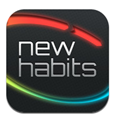 I’ve partnered with Maren and Jamie to convert the how-to content in their book into a deck of knowledge cards that can be used to practice Yoga wisdom one small-step at a time on a daily basis. You can access the results on NewHabits a free iPhone and iPad App. NewHabits comes with two free decks of knowledge cards (motivation and observation) and the Yoga deck is $0.99. Additional decks of knowledge cards covering all eight limbs of Yoga are in the works.
I’ve partnered with Maren and Jamie to convert the how-to content in their book into a deck of knowledge cards that can be used to practice Yoga wisdom one small-step at a time on a daily basis. You can access the results on NewHabits a free iPhone and iPad App. NewHabits comes with two free decks of knowledge cards (motivation and observation) and the Yoga deck is $0.99. Additional decks of knowledge cards covering all eight limbs of Yoga are in the works.
I am interested to hear from readers that use Yoga to improve their cognitive abilities. What technique or limbs do you use?
Categories: Ancient Ways, Cognitive Development, Software Tags:
Learn New Motors Skills Just By Watching Video
 See one, do one, teach one is the best path to learning a new skill or so the old saying goes. But how much do you actually learn just by watching especially as you get older? Quite a bit, at least according to recent research to be presented at an upcoming meeting of the American Academy of Neurology.
See one, do one, teach one is the best path to learning a new skill or so the old saying goes. But how much do you actually learn just by watching especially as you get older? Quite a bit, at least according to recent research to be presented at an upcoming meeting of the American Academy of Neurology.
The study is discussed in a Science Daily blog post, Can You Boost Your Brain Power By Watching a Video? The findings are dramatic. Watching a video of how to perform a motor skill, improved performance by 11 times compared to a control group that watch videos on a topic unrelated to the motor skill (landscape videos). The researchers conclude:
“Our study lends credence to the idea that even as an adult, your brain is able to better learn skills just by watching the activity take place.”
While they tested on simple motor skills such as manipulating coins and cutting with scissors we are left wondering if it would work on more complex skills such as martial arts or drawing.
Categories: Other Tags:
How to Avoid Short Circuiting Your Thinking
 We are capable of great feats of thinking but we can also short circuit (mess up) how we perceive, remember, learn and make decisions on a regular basis. We all have these thinking foibles and scientist described them in various ways from decision traps to cognitive bias and heuristics of reason. For a quick overview of some of the biggest ones, check out five common mistakes your brain makes every day.
We are capable of great feats of thinking but we can also short circuit (mess up) how we perceive, remember, learn and make decisions on a regular basis. We all have these thinking foibles and scientist described them in various ways from decision traps to cognitive bias and heuristics of reason. For a quick overview of some of the biggest ones, check out five common mistakes your brain makes every day.
The post covers memory, expectations, loss aversion, stereotyping and predicting odds in simple terms and provides examples. What it does not provide (and most sources don’t) is ways to overcome or avoid them. For example, we are told that we trust our memories more than we should. We assume we remember events and experiences accurately when if fact there is good evidence that shows we distort and recreate them regularly. But what can you do? If I am not to trust my memory, what practical steps can I take to avoid the biases and mistakes of a faulty memory?
I am interested to hear from readers that have developed techniques to deal with unreliable memories, overbearing expectations or any of the other common mistakes our brain makes everyday. Such techniques should be a great way to improve our cognitive performance on a regular basis. Just what we want to discuss on the Next Brain Blog.
Categories: Other Tags:
Cognitive Vitality As We Get Older
 You will often hear that staying “mentally active” is important for maintaining a brain health as you age. A variation on the use it or lose it theme. But what exactly does being mentally active mean in this sense? Is reading a book OK and watching an action movie not?
You will often hear that staying “mentally active” is important for maintaining a brain health as you age. A variation on the use it or lose it theme. But what exactly does being mentally active mean in this sense? Is reading a book OK and watching an action movie not?
A new study tackles this question and the findings are interesting. Turns out activities such as – playing a game, listening to classical music or solving cross word puzzles – “probably won’t bring noticeable benefits to an aging mind”. That is an interesting claim as these types are activities are frequently sited as good examples of what should provide benefit.
The key is to engage in mental activities outside your comfort zone that force you to learn new skills. For example, learning photography or quilting. The general point is:
“It seems it is not enough just to get out and do something — it is important to get out and do something that is unfamiliar and mentally challenging, and that provides broad stimulation mentally and socially,…”
Doing mental activities that we have already mastered, while still worthwhile, may not be providing the brain boost and protection we need as we age.
Categories: Cognitive Decline, Cognitive Development, Lifestyle, Memory and Learning, Older Adult Tags:
More Items for Your Brain Foods List
 In the Next Brain blog we report on foods that offer some scientific promise of either protecting your brain health or improving cognitive performance. A list of 10 Top Foods to Boost Brainpower published by Forbes Magazine caught my eye. While it includes items typically found on such lists – for example blueberries, curry and walnuts – it also includes many I don’t normally see such as chickpeas, celery and crab.
In the Next Brain blog we report on foods that offer some scientific promise of either protecting your brain health or improving cognitive performance. A list of 10 Top Foods to Boost Brainpower published by Forbes Magazine caught my eye. While it includes items typically found on such lists – for example blueberries, curry and walnuts – it also includes many I don’t normally see such as chickpeas, celery and crab.
The claim about crab is particularly interesting. A serving exceeds your daily requirement of phenylalanine, an amino acid that is needed to create dopamine. I am going to do a little research into that and will blog my findings.
Source of image: openclipart.org
Categories: Cognitive Decline, Diet Tags:
2013 Sharp Brains Virtual Summit
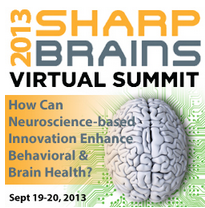 Sharp Brains organized an on-line summit focused on understanding how neuroscience-based innovation can enhance behavioral and brain health. The event included some 30 speakers covering industry and academia. The organizers summarized the top 30 highlights some of which are relevant for readers of the Next Brain Blog. For example:
Sharp Brains organized an on-line summit focused on understanding how neuroscience-based innovation can enhance behavioral and brain health. The event included some 30 speakers covering industry and academia. The organizers summarized the top 30 highlights some of which are relevant for readers of the Next Brain Blog. For example:
“The breakdown of how much time/effort is required to practice different types of meditation/relaxation exercises, and why Kirtan Kriya meditation may be more efficient and scalable than other forms of meditation as a public brain health measure for Alzheimer’s Disease prevention. (Dharma Singh Khalsa)”
You can access recordings to all the talks for $175. I am going to buy and review them later this month.
Categories: Other Tags:
A Placebo for Cognitive Enhancement?
In the Next Brain blog we report on research that suggests how we think about our own mental abilities has a significant impact on how well we perform. For example, in Perception of Age Impacts Cognitive Performance, we reported on a study that shows simply “thinking that you are old” will impact your score on a dementia test.
 Self-image, especially as it relates to what we believe we know, might be a powerful placebo for cognitive performance. More evidence comes from Your Thinking can Release Abilities Beyond Normal Limits, in The Scientific American. The article reviews an experiment that shows if you expect to know the answer to a question you tend to score better.
Self-image, especially as it relates to what we believe we know, might be a powerful placebo for cognitive performance. More evidence comes from Your Thinking can Release Abilities Beyond Normal Limits, in The Scientific American. The article reviews an experiment that shows if you expect to know the answer to a question you tend to score better.
Such results suggest (but by no means prove) that confidence, positive thinking, a growth mindset and affirmation could have a significant impact on memory, learning, creativity, visual acuity and a wide-range of cognitive performances.
This is a good news. It does not take too much effort to develop a positive affirmation about our mental abilities and then repeat it on a regular basis. For example, when struggling with a hard problem you could regularly repeat: “As I have in the past, I will see the answer to this problem”. You could even combine the affirmation with a ritual such as sitting in your creative chair or wearing your lucky shirt.
I am interested to hear from readers that have examples of placebos for cognitive performance.
Categories: Lifestyle, Mental Focus, Problem Solving Tags:
Assess Your Practical Creativity in 3 Minutes
Mind Tools has developed a 16-question creativity test you can complete in about 3 minutes. Not only does it give you an overall creativity score and rank, but you get a question by question analysis and suggestions for how to improve.
I have built some of the best techniques for improving creativity into NewHabits, a free iPhone and iPad app. Once you download the app, tap the store tab and check out Reframe, a deck of knowledge cards designed to help you master advanced creativity techniques.
There are a total of 25 cards. Play a card daily from your mobile device to experiment with and eventually master a proven creativity technique. Cards are designed to fit into everyday routines and take minutes to use. The Reframe cards work by converting general advice and complex how-to knowledge about creativity into right-sized chunks that are optimized for how we learn from experience.
A list of the Refram cards and an example are shown below.
Categories: Problem Solving, Software Tags:

